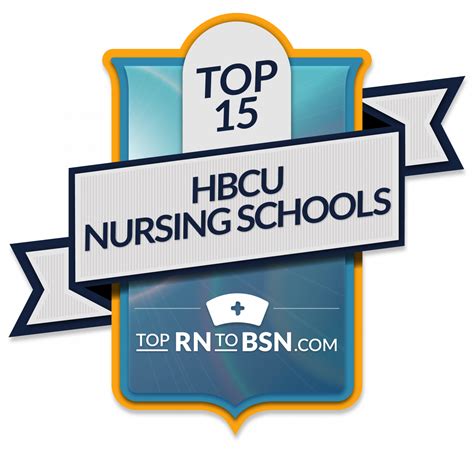Aspiring nurses seeking a transformative education within a historically Black college or university (HBCU) have a wealth of exceptional options to consider. HBCU nursing programs provide a unique blend of academic excellence, cultural sensitivity, and community engagement, fostering the growth of compassionate and highly skilled nurses.

Evaluating HBCU Nursing Programs
When selecting an HBCU nursing program, consider factors such as:
- Accreditation: Ensure the program is accredited by the Commission on Collegiate Nursing Education (CCNE) or the American Association of Colleges of Nursing (AACN).
- Faculty Credentials: Assess the qualifications and experience of the nursing faculty and their commitment to student success.
- Clinical Experiences: Evaluate the quality and diversity of clinical experiences offered, including partnerships with hospitals and community organizations.
- Student Support: Inquire about academic advising, tutoring, scholarships, and other resources available to support students’ academic and personal growth.
- Career Services: Explore the career services provided by the institution, such as resume writing, interview preparation, and job placement assistance.
Top-Ranked HBCU Nursing Programs
Based on rankings, program quality, and alumni success, the following HBCU nursing programs stand out:
| Institution | Program Type |
|---|---|
| Tennessee State University | Bachelor of Science in Nursing, Master of Science in Nursing, Doctor of Nursing Practice |
| Florida A&M University | Bachelor of Science in Nursing, Master of Science in Nursing, Doctor of Nursing Practice |
| Hampton University | Bachelor of Science in Nursing, Master of Science in Nursing |
| Tuskegee University | Bachelor of Science in Nursing, Master of Science in Nursing |
| North Carolina A&T State University | Bachelor of Science in Nursing, Master of Science in Nursing, Doctor of Nursing Practice |
Benefits of HBCU Nursing Programs
HBCU nursing programs offer a range of advantages for aspiring nurses, including:
- Diverse and Inclusive Environment: HBCU campuses foster an environment that embraces and celebrates diversity, providing a welcoming and supportive space for students from all backgrounds.
- Culturally Competent Nurses: Nursing programs at HBCUs emphasize cultural competency and the provision of equitable and culturally sensitive care to diverse patient populations.
- Community Engagement: HBCU nursing programs actively engage with the surrounding communities, providing students with opportunities to participate in service-learning projects and gain hands-on experience.
- Strong Alumni Networks: HBCU nursing programs have established strong alumni networks, providing graduates with valuable connections in the healthcare industry.
- Financial Support: HBCU nursing programs often offer financial aid packages and scholarships specifically designed to support students from underrepresented minority groups.
Common Mistakes to Avoid
To maximize their success in HBCU nursing programs, students should avoid common mistakes such as:
- Underestimating the Rigor: Nursing programs at HBCUs are academically challenging and require a strong commitment to study and clinical practice.
- Neglecting Clinical Experiences: Clinical experiences are essential for developing the skills and knowledge necessary for a successful nursing career.
- Ignoring Student Support Services: HBCU nursing programs offer a range of student support services. Failing to take advantage of these resources can hinder academic progress.
- Not Engaging with the Community: Community engagement is an integral part of nursing education at HBCUs. Students should actively participate in service-learning projects and volunteer opportunities.
- Failing to Network: Building connections with peers, faculty, and healthcare professionals can enhance career opportunities and provide valuable support throughout the nursing journey.
Step-by-Step Approach to HBCU Nursing Programs
To navigate the HBCU nursing admissions process effectively, follow these steps:
- Research: Explore different HBCU nursing programs and compare their offerings and rankings.
- Apply Early: Submit your applications well before deadlines to increase your chances of acceptance.
- Attend Campus Tours: Visit HBCU campuses to experience the atmosphere and meet nursing faculty and students firsthand.
- Prepare for Standardized Tests: Study diligently for the NCLEX-PN or NCLEX-RN exams, as required by the nursing program.
- Submit a Strong Essay: Prepare a compelling personal statement or essay that highlights your passion for nursing and qualifications for the program.
- Secure Letters of Recommendation: Request letters of recommendation from professors, supervisors, or community leaders who can attest to your character and habilidades.
FAQs
1. What is the difference between an HBCU and a non-HBCU nursing program?
HBCU nursing programs are located at historically Black colleges and universities, which have a mission to educate and empower students from underrepresented minority groups.
2. Are HBCU nursing programs as rigorous as non-HBCU programs?
Yes, HBCU nursing programs are accredited by the same organizations as non-HBCU programs and maintain high academic standards.
3. Do HBCU nursing programs provide clinical experiences?
Yes, HBCU nursing programs offer robust clinical experiences through partnerships with hospitals and community organizations, providing students with hands-on practice in various healthcare settings.
4. What are the career prospects for HBCU nursing graduates?
HBCU nursing graduates are highly sought after by healthcare institutions due to their cultural competency, clinical habilidades, and commitment to providing equitable care.
5. How can I finance my HBCU nursing education?
HBCU nursing programs offer a range of financial aid options, including scholarships, grants, and loans, to support students from diverse socioeconomic backgrounds.
6. What are the unique benefits of HBCU nursing programs?
HBCU nursing programs offer a diverse and inclusive environment, culturally competent training, community engagement opportunities, strong alumni networks, and financial support for students from underrepresented minority groups.
